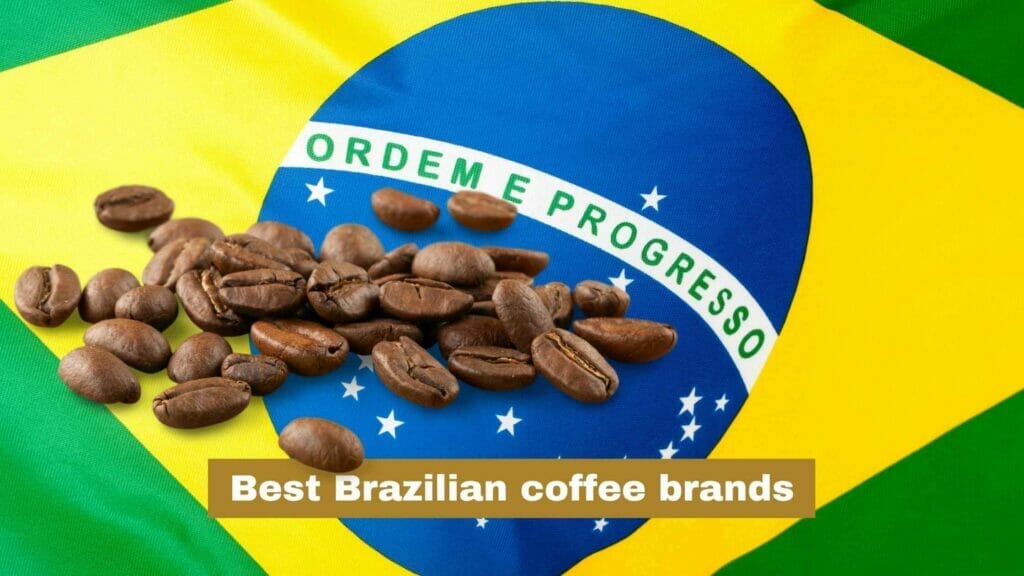
Brazil is the number one coffee producer in the world. A study done in 2018 showed that Brazil produces 40% of the world’s coffee is double the amount of coffee of its competitor, Vietnam.
Brazil has been producing coffee since 1770. The first coffee plantation was established in Rio de Janeiro. In the 1800s, its coffee production took off. By the end of the 1800s, Brazil was exporting more than a billion pounds of coffee each year.
When the 1990s rolled around, Brazil gained a reputation for making some of the best coffee beans in the world. They stayed ahead of their time, creating the Brazilian Specialty Coffee Association (BSCA), which focuses on quality coffee through improved production, environmental preservation, and sustainable environmental development.
The best Brazilian coffee brands represent what the BSCA was supposed to accomplish. They are full-bodied, sweet, low-acid, and delicious.
Key Takeaways:
- Brazil is the largest coffee producer in the world, responsible for 40% of the global coffee production, which is double the amount of its competitor, Vietnam.
- Brazilian coffee production dates back to 1770, with the first coffee plantation established in Rio de Janeiro. By the late 1800s, Brazil was exporting over a billion pounds of coffee annually.
- Brazil established the Brazilian Specialty Coffee Association (BSCA) in the 1990s, which focuses on improving coffee quality, environmental preservation, and sustainable development.
- Brazilian coffee is known for being low in acidity, making it a versatile and appealing choice for coffee lovers.
- Brazil grows both Robusta and Arabica beans, but the majority of its exported coffee beans are Arabica.
- The climate and rich soil in Brazil contribute to the full-bodied, aromatic, and sweet flavors of Brazilian coffee.
- There are 14 significant coffee regions in Brazil, with Minas Gerais being the top-producing state. Each region has unique characteristics that influence the flavor of the coffee beans.
What Kind of Coffee is From Brazil?
Brazil produces coffee Robusta and Arabica beans. Robusta beans are a small portion of their coffee bean production, and most of Brazil’s exported coffee beans are Arabica.
Brazil grows a variety of specialty beans which includes the following:
- Bourbon – Brazil’s rare yellow Arabica coffee bean.
- Mundo Novo – Hybrid of Bourbon and Typica Arabica bean.
- Caturra – A natural variation of the Bourbon coffee bean.
- Catuai – Hybrid of Caturra and Mundo Nove bean.
What is Special About Brazilian Coffee?
Brazil is known for its tropical climate, which makes it optimal for growing quality beans. Its tropical climate contributes to its rich soil and, therefore, the full-bodied, aromatic coffee beans from Brazil. What else makes it so noteworthy?
Low-Acidity
Brazilian coffee beans are very low in acidity, making them a versatile choice. Some coffee drinkers prefer to drink low-acid coffee or have no other choice. Any coffee lover can enjoy a cup of Brazilian coffee with no regrets. You may think low-acid coffee will taste bad, but the lack of acidity in Brazil’s coffee beans takes nothing away from the quality of the beans.
Bean Variety
Brazilian coffee has different types of coffee beans that contribute to the coffee’s taste. Because it is a blend of various beans, the taste is unique, with a smooth, rich quality. It’s part of what sets Brazilian coffee apart from other coffees.
Sweetness
Along with the richness of Brazilian coffee, you will discover that it is deliciously sweet. Its natural flavors are chocolaty, nutty, and fruity. Its sweet flavor and richness are perfectly married to create a well-balanced coffee.
Brazilian coffee beans are dry-processed, meaning they remain in the fruity layer of the bean while they are dried. The natural sweetness of Brazilian coffee beans comes out as a result of the drying process.
Is Brazilian Coffee High in Caffeine?
In short, no. Brazilian coffee is low in caffeine. Darker roasts tend to be lower in caffeine, and since Brazilian coffee is a dark roast coffee, you are getting less caffeine than you would in a medium or light roast coffee. It is especially true for Arabica beans.
Robusta beans have more caffeine than Arabica beans, so the caffeine content will be higher if Brazilian coffee contains Robusta beans.
Famous Brazilian Coffee Regions
Brazilian coffee is grown all over Brazil from east to west and down in the south. There are 14 significant coffee regions in Brazil, but a few are known as the top-producing regions.
Minas Gerais
Minas Gerais produces more Brazilian coffee than any other state in Brazil. Its high altitudes and healthy, rich soil foster the growth of some of the best coffee beans in the world.
Within the state of Minas Gerais are four major growing regions: Cerrado de Minas, Chapada de Minas, Matas de Minas, and Sul de Minas.
Each region has the climate, soil, and overall environment to grow Brazilian coffee beans.
Cerrado de Minas grows beans that are even-bodied and mildly sweet.
Chapada de Minas grows a mixture of different beans, including Catuaí and Mundo Novo beans.
Matas de Minas grows sweet coffee beans that have notes of chocolate and caramel.
Sul de Minas grows a variety of beans that are full-bodied with a little bit of citrus.
São Paulo
São Paulo has two major coffee regions. These regions are Mogiana and Centro-Oeste de São Paulo.
Mogiana is a region close to the Minas Gerais border. It is at a high altitude, has fertile soil, and a moderate climate. This region produces some of the finest coffee beans in Brazil.
Centro-Oeste de São Paulo is a smaller growing region similar to Mogaina in terrain.
Espirito Santo
Second, to Minas Gerais in size, this state primarily grows Robusta beans. It has two regions: Montanhas do Espírito Santo and Conilon Capixaba.
Montanhas do Espírito Santo is in the highlands of Espírito Santo and grows fruity, acidic coffee beans.
Conilon Capixaba grows Robusta beans in small fields at low elevations.
Bahia
Bahia is a state that has been growing beans for a shorter amount of time than other states. It is known for its high-quality beans and advanced growing methods. Its two regions are Cerrado and Planalto da Bahia.
The coffee beans are mostly Arabica and on the sweeter side in these high-altitude regions.
Brazil offers diversity and variety in its coffee beans. Each region has an array of characteristics that contribute to the growth of the best coffee beans in the world.
The brands that exemplify what Brazilian coffee is all about are listed below.
The 8 Most Popular and Best Brazilian Coffee Brands
1. Volcanica – Yellow Bourbon Coffee
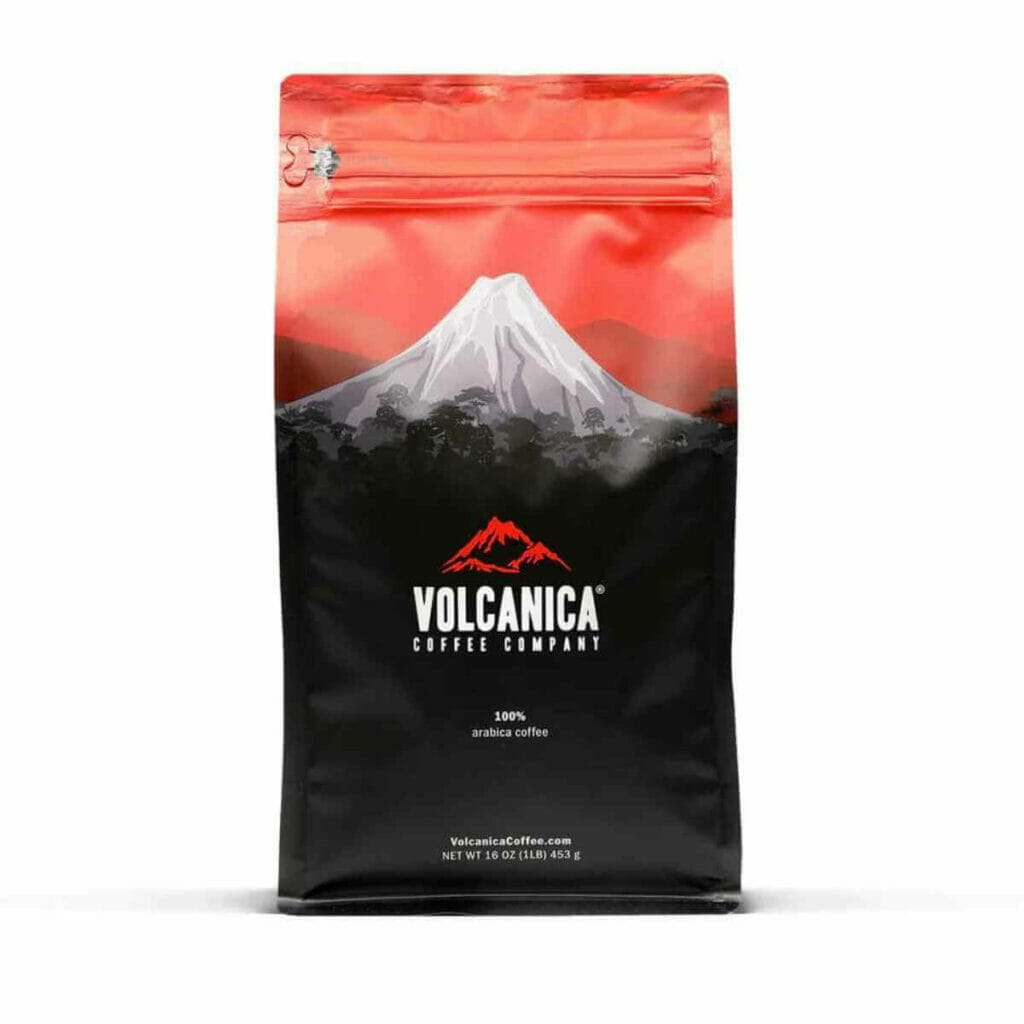
Volcanica Coffee Company is well-known for its high-quality, tasty coffee. Volcanica’s Yellow Bourbon Coffee is 100% pure Brazilian coffee.
It is a light roast with an evenly balanced flavor and a full body. It is mild and has a smooth consistency with a sweet, citrusy flavor with a little bit of a nutty flavor.
This coffee comes with whole beans, and you can grind them in your home for maximum freshness.
Pros
- Pure Brazilian coffee
- Balanced Flavor
- Full body
- Fresh whole beans
Cons
- May be too light for some
2. Pilao Coffee – Traditional Roast
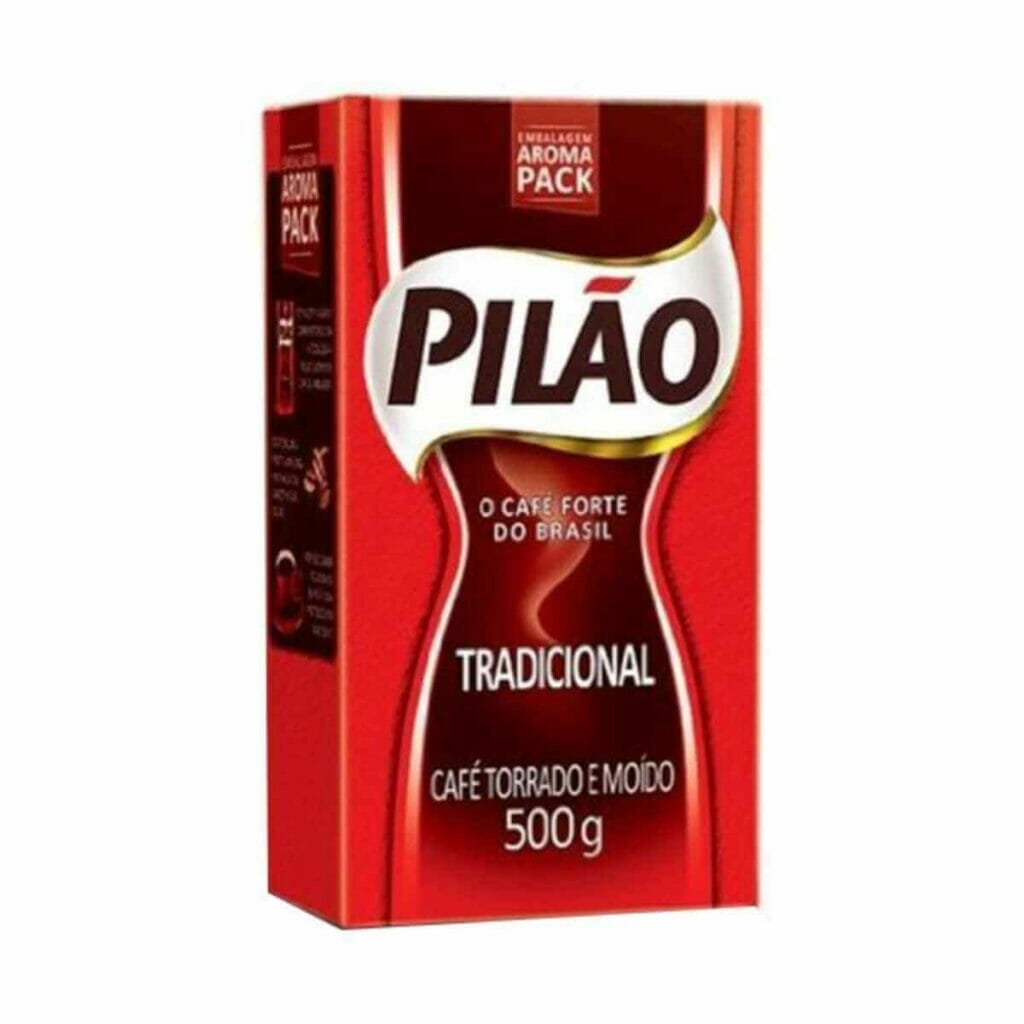
Pilao coffee is one of the most sought-after Brazilian coffee brands. This coffee roast is like a fresh taste of Brazil. It comes vacuum sealed for ultimate freshness.
This traditional blend is a dark roast. Its coffee beans are finely ground with a full-bodied, fruity taste. Pilao coffee is about as traditional as you can get.
Pros
- Traditional Brazilian taste
- Full bodied
- Finely ground
- Vacuum seal for freshness
Cons
- No significant flavor notes
3. 3 Coracoes – Traditional Roast
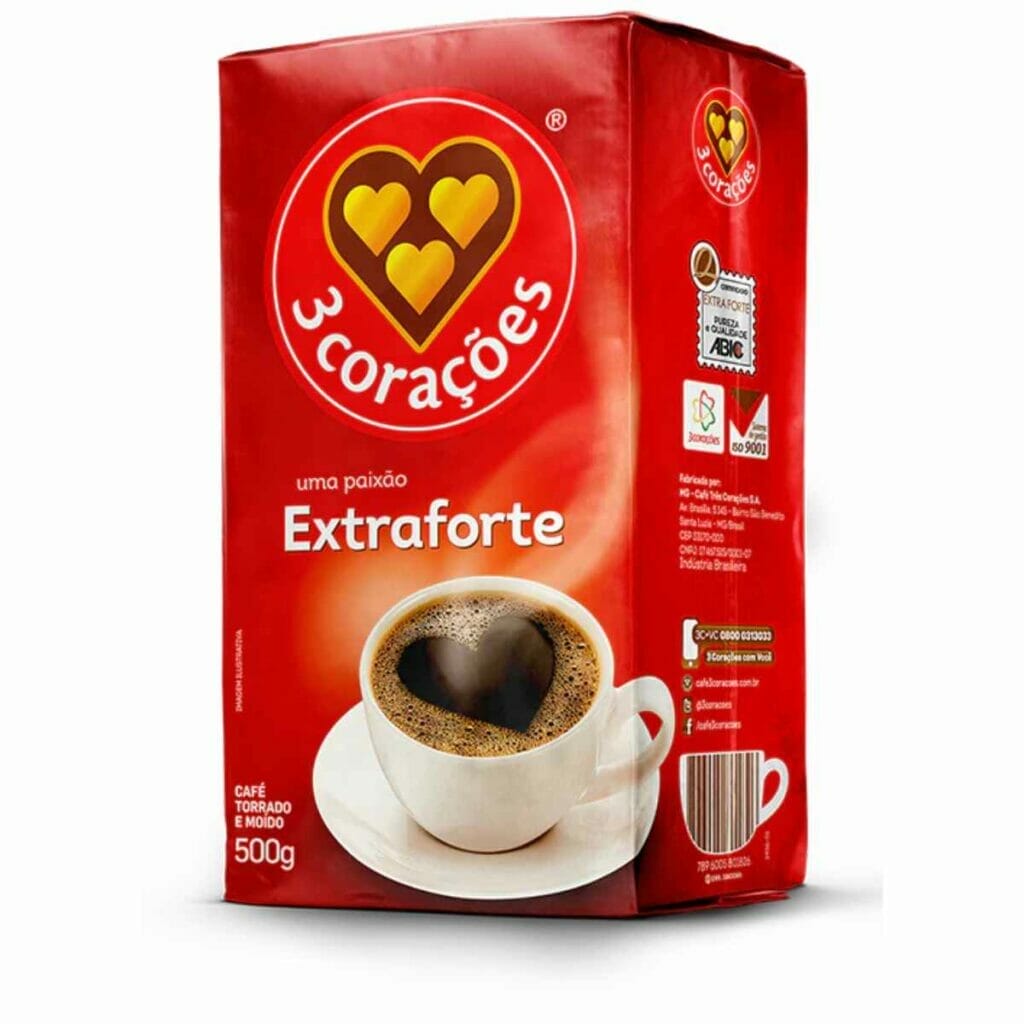
Coracoes is another well-liked Brazilian coffee brand. This company has been selling Brazilian coffee and building its reputation for premium Brazilian coffee since 1959. This climate-pledge-friendly coffee is vacuum sealed for freshness and comes finely ground in a pack of 4.
Coracoes Traditional Roast coffee is a medium roast with a full-bodied flavor containing notes of chestnut, almond, and dried fruit. It has a well-balanced, smooth, and creamy texture.
Pros
- Climate pledge friendly
- Full bodied
- Balanced
- Creamy and smooth texture
Cons
- Could be fresher
4. Peet’s Coffee – Medium Roast
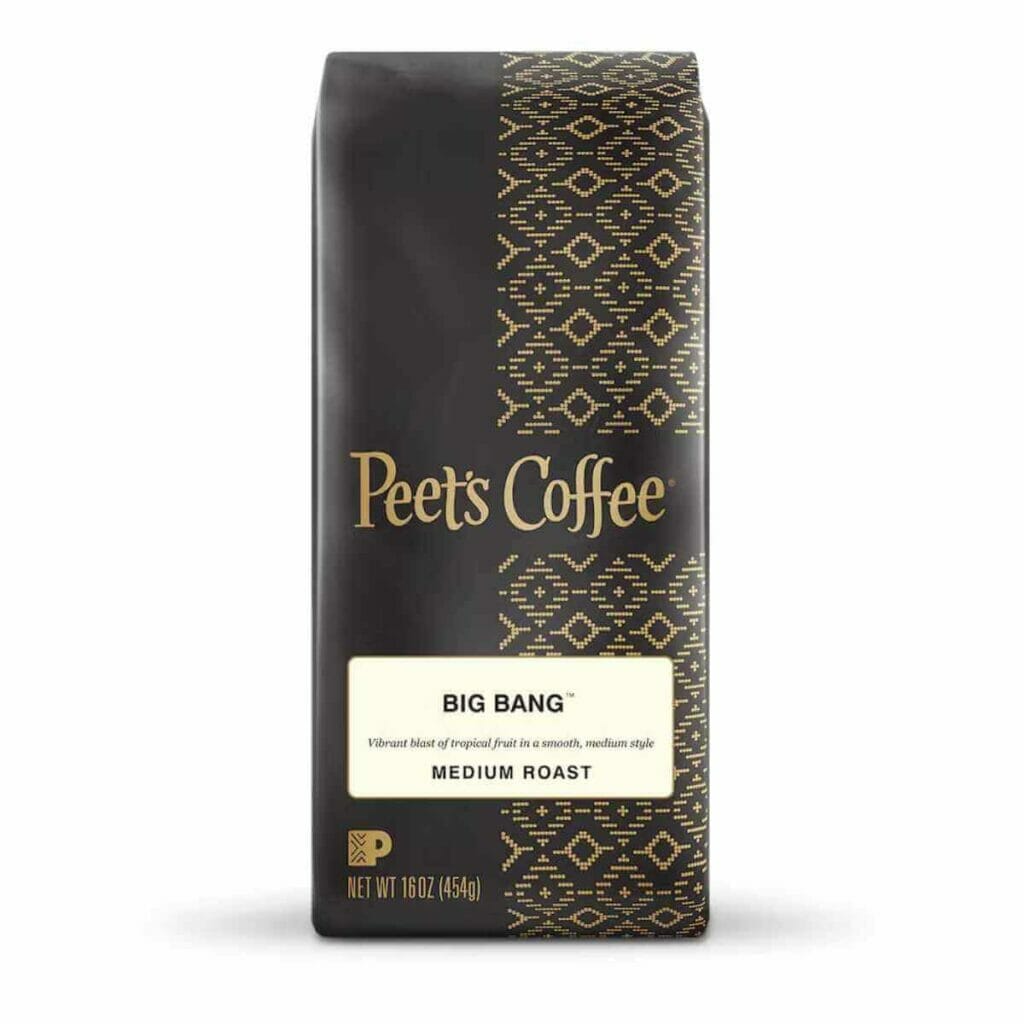
Peet’s Coffee brand has been in business since 1966. They produce top-quality coffee from some of the best coffee beans in the world.
This medium roast Brazilian coffee is single-origin and 100% Arabica. It is pre-ground for convenience, and you can brew it any way you wish to.
The flavors in this coffee include a balanced, full body of dried fruit and nuts. It has a smooth consistency with no bitterness. The coffee grounds are fresh, and the flavors come through nicely.
Pros
- Single-Origin
- 100% Arabica
- Balanced, full body
- No bitterness
Cons
- A little weak
5. Fresh Roasted Coffee – Dark Brazil Cerrado
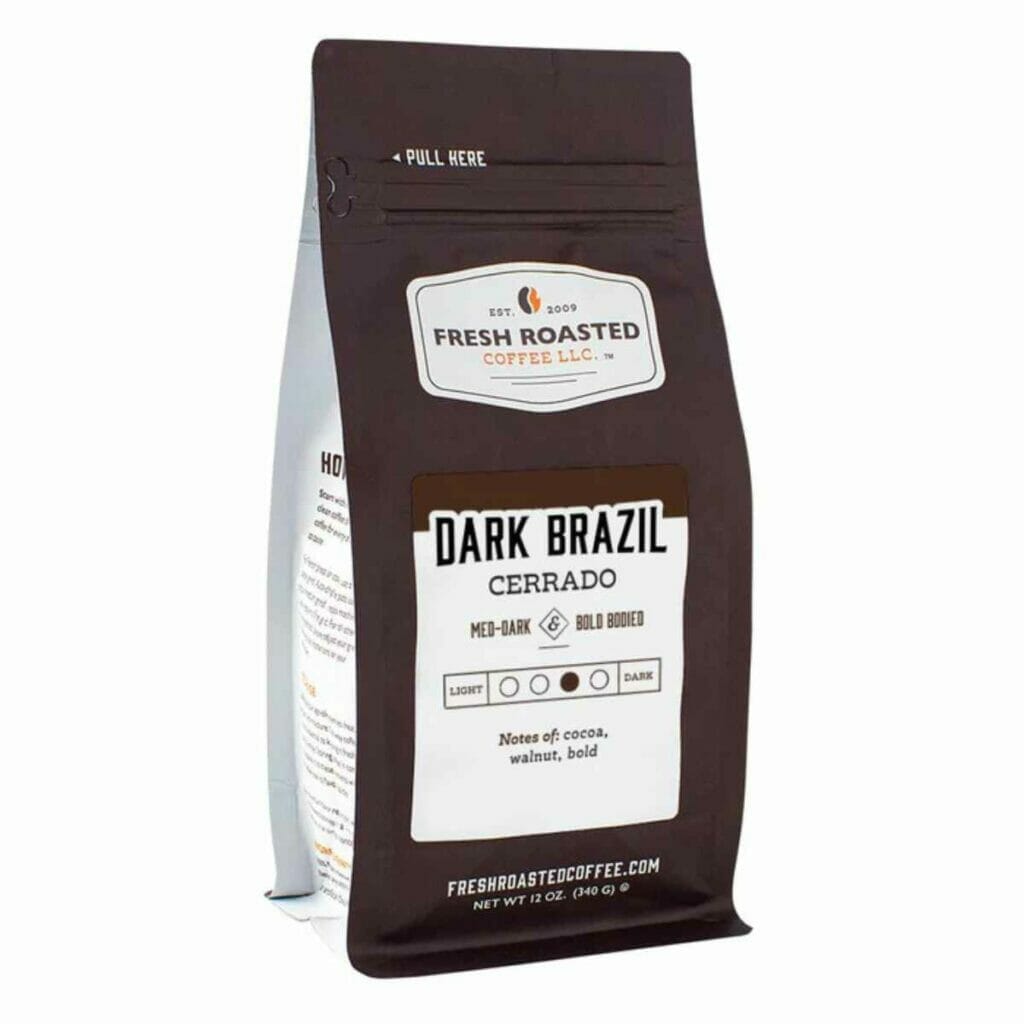
Fresh Roast Coffee LLC produces gourmet coffee focusing on freshness, sustainability, and quality. They roast their coffee to order, so it comes super fresh.
Their medium-dark Brazilian roast is bold with notes of walnut and cocoa. It has a heavy body and embodies the traditional flavor of Brazilian coffee.
This single-origin coffee is kosher, naturally processed, and sun-dried. From the beans to the roasting equipment, this coffee is environmentally friendly.
Pros
- Single-origin
- Kosher
- Bold, heavy-body
- Naturally processed
Cons
- May be too bold for some
6. Coffeebean Direct – Dark Brazilian Santos
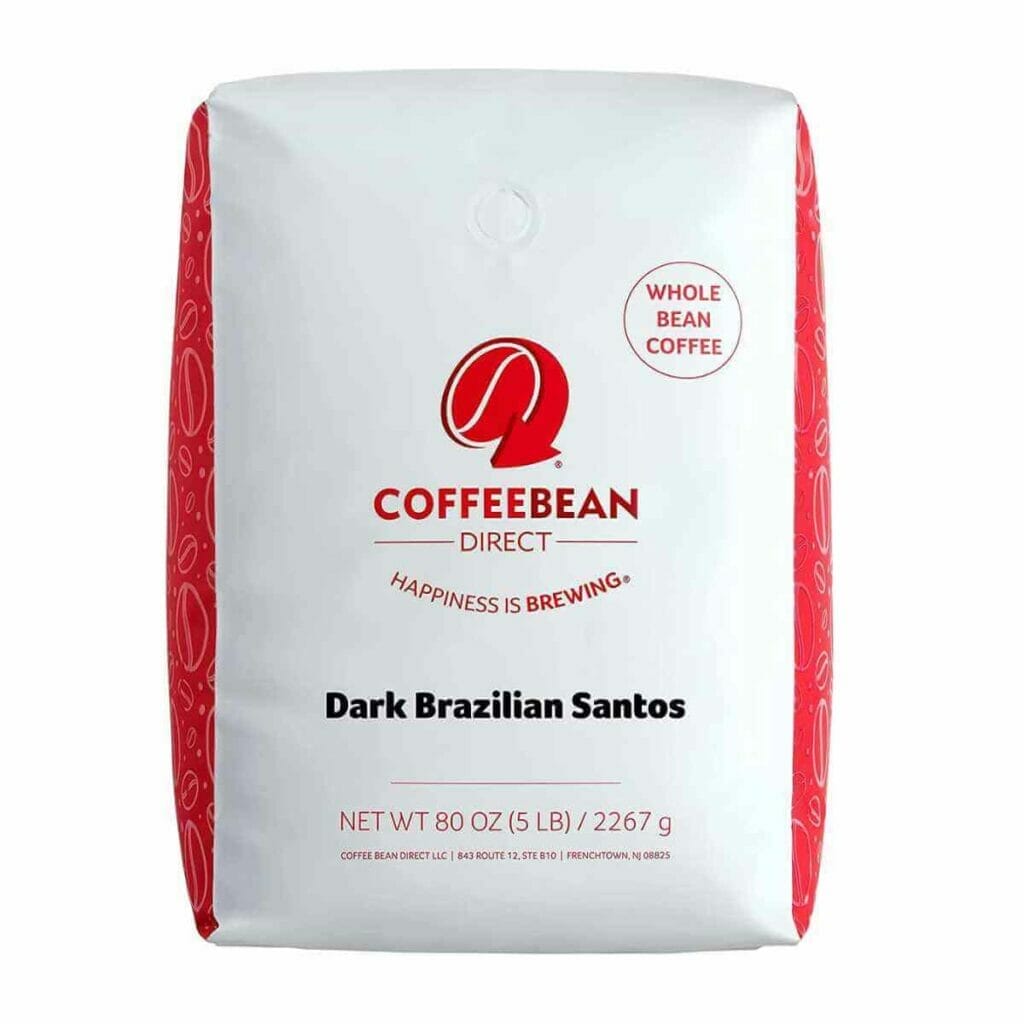
Coffeebean Direct is a company that trades directly with its customers. This company is owned independently and is close-knit, meaning every part of the process is precise and methodical.
Their dark Brazilian whole bean coffee has low acid with a full-bodied, powerful aroma. It has a complex flavor with notes of chocolate, cinnamon, and cherry – equal parts of sweetness and fruitiness.
This 5 lb bag of coffee beans is fresh and ready to be ground in the comfort of your own home.
Pros
- Fresh, whole beans
- Fully body
- Powerful aroma
- Complex flavors
Cons
- Not as bold as other dark roasts
7. Caboclo – Tradition Ground Coffee
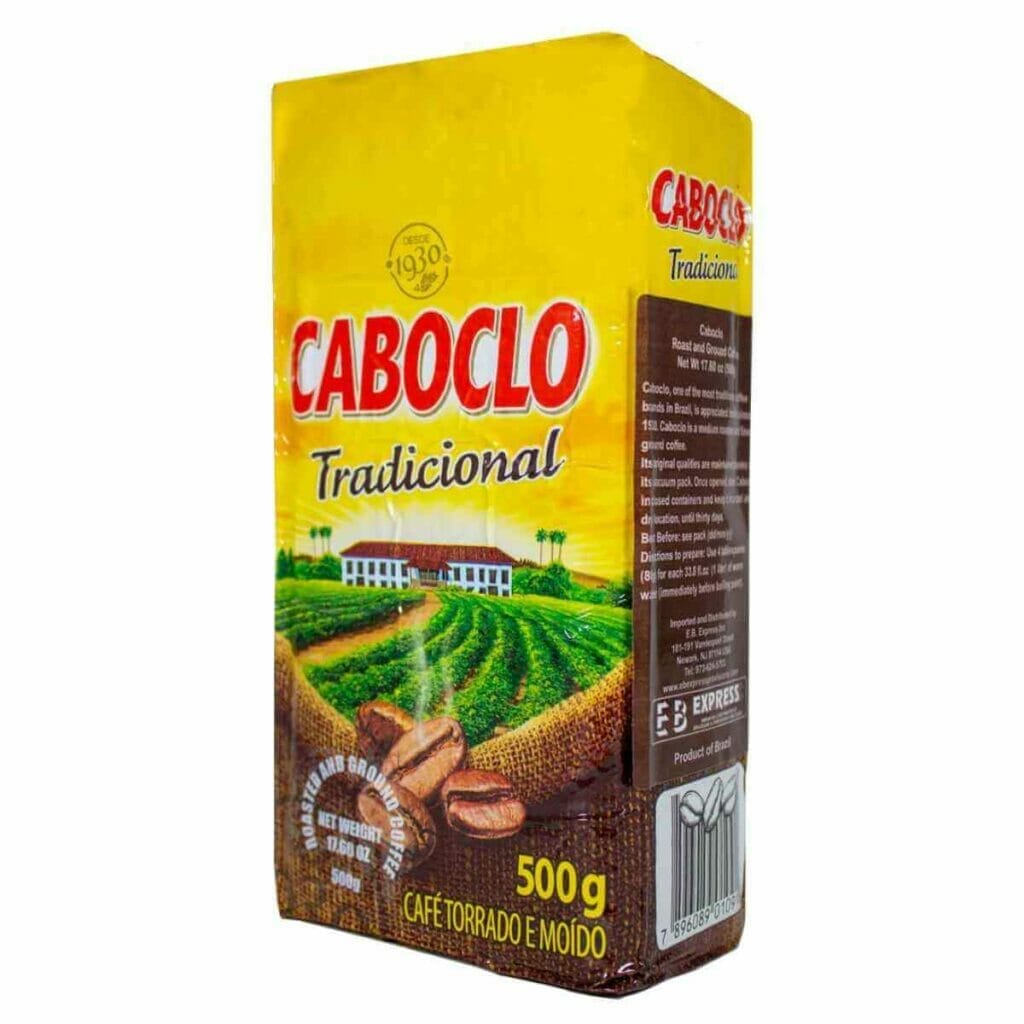
Caboclo is a traditional coffee brand that stays true to the original taste of Brazilian coffee. It has a mixture of Arabica and Robusta beans that helps balance the flavor.
It has a bold taste that comes from the Robusta beans. The boldness of the Robusta beans, combined with the lightness of Arabica beans, give the coffee a little more acidity and fruity notes. This coffee comes finely ground and vacuum sealed for freshness.
Pros
- Bold, but balanced
- Slight acidity
- Vacuum sealed for freshness
Cons
- A little bitter
8. Smokin Beans – Green Coffee Beans
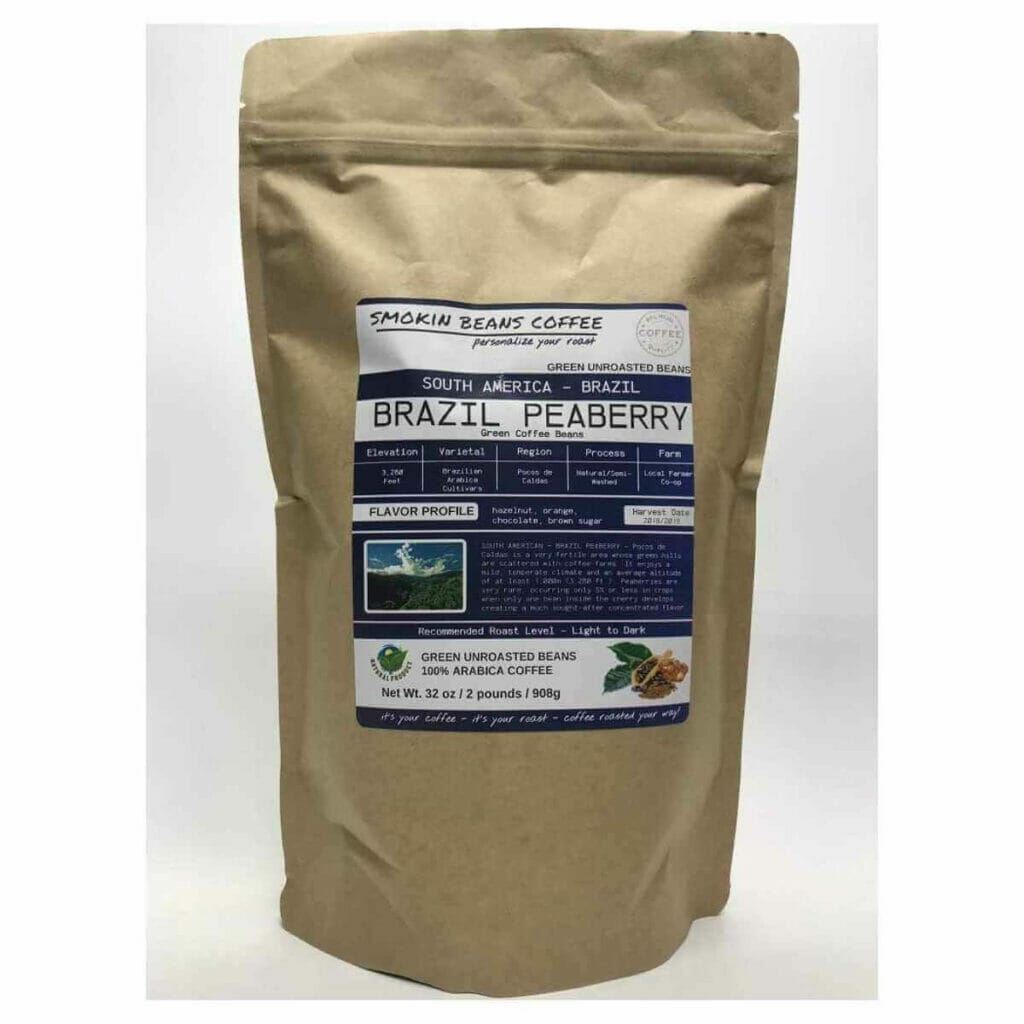
Smokin Beans Coffee Company is a family-owned company that produces gourmet coffee beans. Their system allows customers to choose their coffee roast or roast it at home if desired.
These green coffee beans come unroasted. The process for drying and milling these beans is 100% natural. Being able to roast these beans at home means you get to experience the natural taste the way you want. They will have a nutty flavor with a full-bodied sweetness after roasting.
Pros
- Naturally processed
- Sun-dried
- Full bodied
- Sweet finish
Cons
- Required roasting at home
Brazilian Coffee Buyers Guide
Although every good brand of Brazilian coffee will be tasty, knowing what to look for will help you decide which one you want to try first.
Flavor Profile According to Roast
Knowing the coffee’s flavor profile will help you determine which brands have the taste you want.
Some Brazilian coffee brands have a bold, chocolate, and nutty taste. You will find these flavors in full-bodied medium to dark roasts.
Other brands have a light, nutty, and citrus taste. These flavors are in lighter roasts that are medium-bodied.
Brewing Method
Yes, the brewing method makes a difference. Your brewing method depends on whether or not you can grind your own coffee at home, but when you buy pre-ground coffee, it should work best with your brewing mechanism.
Which brewing methods best bring out the taste of Brazilian coffee?
Three best ways to brew Brazilian coffee
- Espresso – Best with traditional Brazilian coffee
- French Press – Best with dark roast, low-acid Brazilian coffee
- Cold Brew – Great for light to dark roast Brazilian coffee
The Best Choice
Number 1 on the list is Volcanica’s Yellow Bourbon coffee. This coffee is an excellent choice because of its well-balanced, full-bodied flavor. It is a perfect blend of sweet and citrus with a touch of nutty flavor.
This coffee is 100% pure Brazilian coffee that comes in fresh, whole beans. Its high quality and tastiness will leave you wanting more. This coffee is an excellent Brazilian coffee to get you started.
Not interested in this one? There are plenty of delicious options in this article. Take a look and find one that will make your tastebuds dance!
FAQ: Brazilian coffee brands
What are the best Brazilian coffee brands?
The 8 best Brazilian coffee brands are Coffee Bean Direct, Brazil Peaberry, Brazilian Santos, Peet’s Coffee Brazil, Pilao Coffee Traditional Roast, Coffee Traders Brazil, Cafe Du Monde, and Illy Espresso Coffee.
What are some popular Brazilian coffee beans?
Some popular Brazilian coffee beans include Brazil Peaberry, Brazilian Santos, and Brazil Bourbon.
How is Brazilian coffee made?
A: Brazilian coffee is made from coffee beans that are either whole bean or ground coffee. The beans are sourced from coffee plantations in Brazil and then roasted, ground, and brewed to make a delicious cup of coffee.
What is the difference between whole bean and ground Brazilian coffee?
Whole bean Brazilian coffee is the whole coffee bean that is used for grinding and brewing, while ground Brazilian coffee is already pre-ground coffee that is ready to be brewed.
Why are Brazilian coffee beans popular?
Brazilian coffee beans are popular because Brazil is the largest coffee producer in the world. The country has a long history of producing high-quality coffee and offers a variety of coffee flavors and profiles.
What is peaberry coffee?
Peaberry coffee is a type of coffee bean that occurs when only one seed forms inside the coffee cherry, instead of the usual two seeds. These single-seed coffee beans are known for their unique flavor and are highly sought after by coffee connoisseurs.
Where can I buy Brazilian coffee beans?
A: You can buy Brazilian coffee beans online and in specialty coffee shops. Some popular online retailers include Coffee Bean Direct, Peet’s Coffee Brazil, and Coffee Traders Brazil.
What is the Brazilian coffee culture?
The Brazilian coffee culture refers to the rich coffee heritage and traditions in Brazil. Coffee plays a significant role in the country’s economy and daily life, with coffee being enjoyed in homes, cafes, and social gatherings.
What are the characteristics of Brazilian coffee?
Brazilian coffee is known for its full-bodied flavor, low acidity, and chocolatey undertones. It is usually made from a blend of Arabica and Robusta coffee beans, with a focus on producing high-quality coffee.
What makes Brazilian coffee special?
Brazilian coffee is considered special due to the country’s ideal climate and topography for coffee cultivation. The combination of fertile soil, ample rainfall, and a long growing season allows Brazil to produce some of the world’s best coffee.
